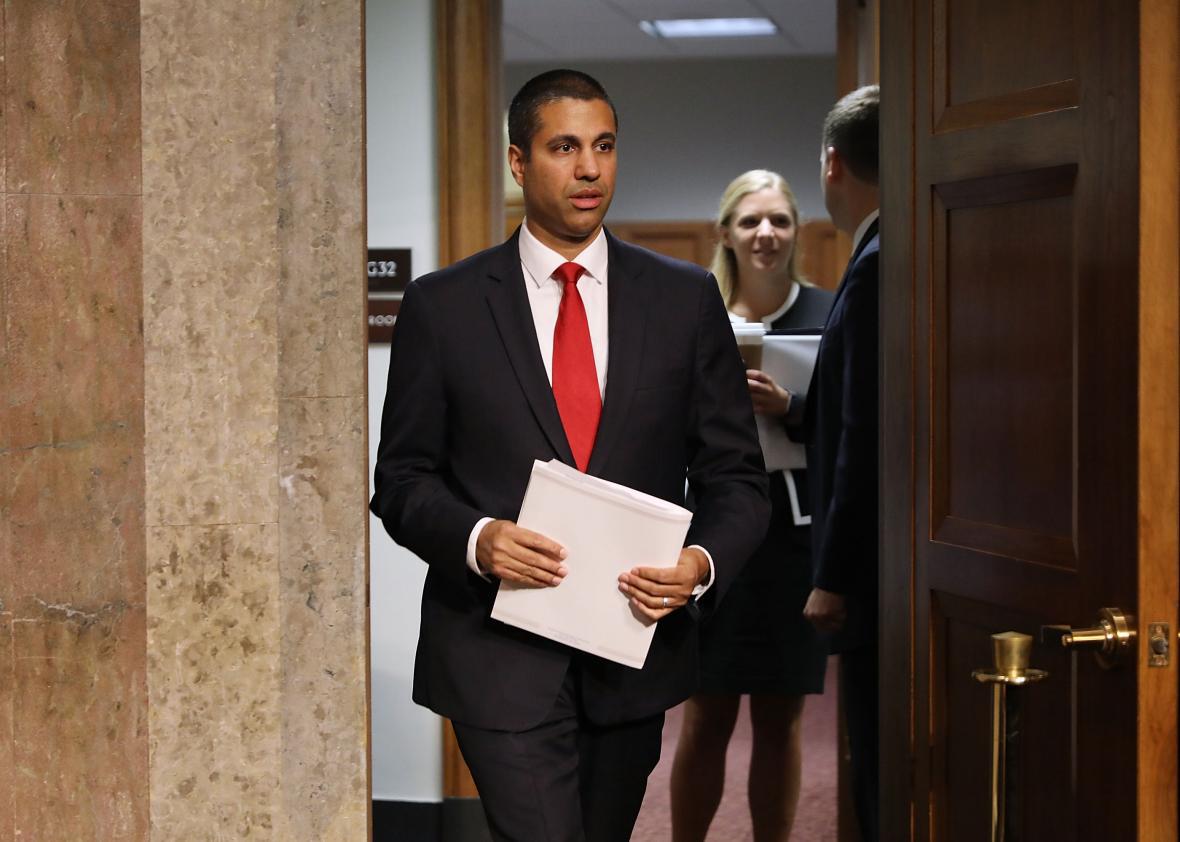This past Tuesday, while many Americans were preoccupied with the logistical nightmare of a house full of disagreeable relatives coming together for Thanksgiving dinner, the chairman of the Federal Communications Commission, Ajit Pai, dumped the news of his plan to undo the hard-won net neutrality rules that prevent internet providers from charging websites to access internet users at faster speeds.
But freaked-out internet fans didn’t let the holiday food coma prevent them from taking action. They have been organizing, as they should, in hopes of convincing the FCC to hit the brakes on the net neutrality repeal process. The commission could vote to rescind the open internet protections as early as Dec. 14. If that happens, then by as soon as the end of January 2018, internet providers may be able to legally offer websites the option to pay for prioritization, a prospect that will likely leave startups and small websites that can’t afford fast lane speeds slower to load and less likely to attract visitors.
So there is work to be done, and it needs to happen quickly. But instead of focusing the ways that the death of the open internet could undermine how Americans work and communicate, some have turned to criticizing Pai himself, even attempting to intimidate his family. On a segment on Fox News on Monday, Pai said that activists had recently come to his home in suburban Virginia with signs directed at his children.
“They will come to know the truth. Dad murdered democracy in cold blood,” read one sign, according to Fox. “Families … should remain out of it and stop harassing us at our homes,” Pai said on Fox & Friends.
It wasn’t the first time that activists apparently showed up near his home. Menacing, handwritten signs also appeared in Pai’s local neighborhood, including one that named his children and the question, “How will they ever look you in the eye again?” In May, in what appeared to be a coordinated campaign by the advocacy group Popular Resistance, people left flyers on Pai’s neighbors’ doors that included his his picture, age, and weight. Unfortunately, such attacks aren’t new to Pai, who has endured a steady stream of racist, lewd, and threatening backlash since April, when he introduced his intention to gut the net neutrality rules.
“Fuck ing brown immigrant comin over here and tryna fu ck over our american freedoms. GO BACK TO YOUR COUNTRY YOU DIRTY SNEAKY INDIAN,” wrote one commenter on the FCC’s docket in May.
“We all have the power to murder Ajit Pai and his family. Jk Jk,” another commenter wrote, as though the “Jk Jk” makes it OK.
There’s a lot to be angry about when it comes to the process to turn back net neutrality protections. It’s been mired by deeply troubling irregularities: The public comment docket is loaded with submissions from bots and dead people, not to mention a suspicious cyberattack on the FCC’s comment system, which is currently under investigation. But these disgusting ad-hominem attacks on the FCC chairmen do absolutely nothing to help the cause of net neutrality.
Before becoming a journalist, I worked on various tech policy issues, including network neutrality at the Electronic Frontier Foundation, where I blogged about the importance of protecting open internet regulations. My work at Slate today is informed by my researched and strong opinion that it’s critically important to prevent internet providers from deciding what websites get to load faster than others. I fully realize that it is a dense, technical, confusing topic, and that it is difficult to build a public campaign around regulating internet traffic speeds.
But the solution is not to send racist comments to Pai and threaten his family, or to circulate internet memes depicting Pai’s face surrounded by lewd sexual imagery. Such tactics have absolutely nothing to with the substance of Pai’s anti-net neutrality proposal—and there is plenty there to mock and criticize.
So please, if you do want to participate in the public debate over saving network neutrality, stick to the facts and your personal stories about why accessing an open internet is important to you. Send comments to the FCC. Call your member of Congress. Demonstrate at the FCC or Comcast or AT&T or Verizon. Hang signs. Share information online. And if you do see a tweet or comment personally attacking Ajit Pai or his family, consider reporting or condemning it. The FCC is expected to vote to rescind net neutrality in less than three weeks. Don’t squander the narrow window on useless or even worse, harassing messages. The fate of the internet is at stake.
